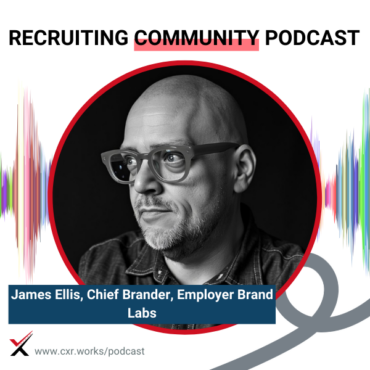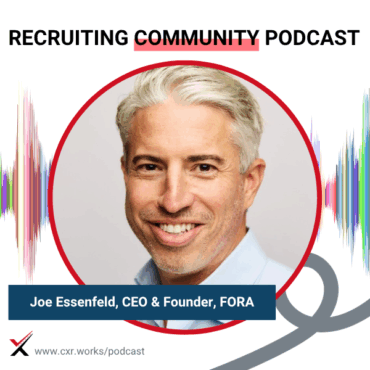
Unlocking AI Insights
Can AI transform both the candidate and executive experience? Joe Essenfeld shares how smart tools are enhancing productivity and reshaping recruiting.
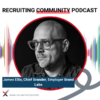 play_arrow
play_arrow
Talent Chooses You: Reframing the Role of TA in Driving Growth Cami Grace
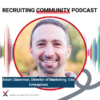 play_arrow
play_arrow
Inside the Cox Career Site Redesign: Data, AI & Candidate Experience Cami Grace
 play_arrow
play_arrow
Vietnam TA/HR Delegation Recap Cami Grace
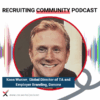 play_arrow
play_arrow
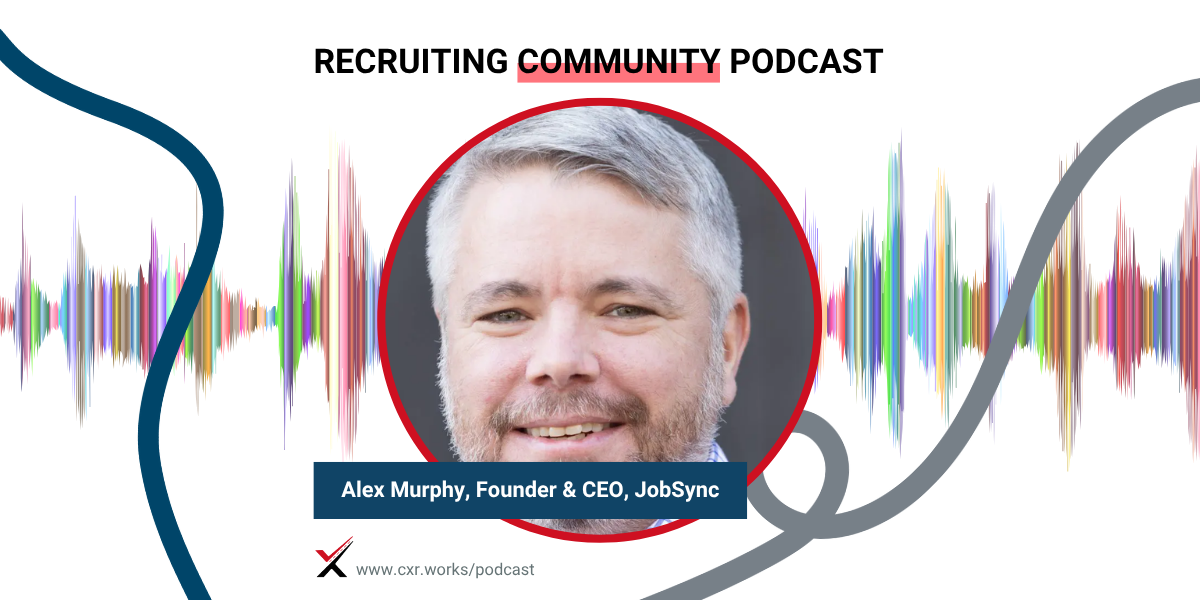
Episode Overview:
Guest Alex Murphy, CEO and founder of JobSync, engages in a detailed discussion around the findings from a recent panel on transparency and conflict of interest within the talent acquisition industry. Murphy highlights the influence of undisclosed incentives on recommendations and the importance of transparency in vendor relations.
Key Topics Covered:
Impact of Conflicts of Interest: The discussion delves into how undisclosed financial incentives can skew vendor recommendations, potentially leading to inefficient recruiting practices and a clutter of underutilized tools.
Importance of Transparency: Emphasis is placed on the necessity for full disclosure of financial incentives from vendors to maintain trust and integrity within the industry.
Potential Solutions and Tools: The podcast touched on the development of tools like riders for RFPs (Request for Proposals) to help procurement teams ask the right questions regarding vendor incentives.
Closing Notes:
The episode wraps up with a call to action for more industry-wide transparency and ethical practices, urging listeners to subscribe for future episodes and check out additional resources on the CXR website. This conversation underscores a pivotal shift towards more ethical and transparent practices within talent acquisition, aiming to foster a more trustworthy environment for all stakeholders involved.
Title:
Conflicts of Interest in Talent Acquisition
Featured Guests:
Alex Murphy, CEO and Founder, JobSync
Hosts:
Chris Hoyt
Gerry Crispin
Episode Overview:
Alex Murphy joins the podcast to discuss findings from a recent CXR research panel focused on transparency and conflicts of interest in talent acquisition. The panel, consisting of over 40 TA professionals and industry leaders, explored how undisclosed financial incentives affect trust, speed of decision-making, and ethical practices in the industry. The episode outlines actionable recommendations to foster integrity and transparency in TA advisory roles and vendor interactions.
Key Topics:
Definition and examples of conflicts of interest in TA
Impact of undisclosed vendor relationships on trust and decision-making
Recommendations for conferences and consultants to disclose financial ties
Proposed RFP language to identify and mitigate conflicts
Role of procurement teams in managing ethical vendor engagement
Importance of peer-driven, transparent tools like the CXR Marketplace
Upcoming public release of a downloadable RFP rider
Notable Quotes:
“The issue is when advice or recommendations are being made, but there’s a financial incentive behind that advice—and the recipient doesn’t know about it.” — Alex Murphy
“If I trust my advisor fully, I move faster. If I question their motives, I hesitate.” — Chris Hoyt
“Analysts, consultants, speakers—they all deserve to be compensated. But be upfront about it.” — Gerry Crispin
“Some vendors pay double the referral fee of others—so are they being recommended because they’re better, or because they pay more?” — Alex Murphy
“Speak Hard Truths.” — Alex Murphy
Takeaways:
The panel revealed broad concern about conflicts of interest in talent acquisition and their impact on trust and decision-making. Through collaborative discussion, participants recommended concrete actions like disclosure requirements at conferences, updated procurement language, and community accountability. A public resource for RFPs will soon be available to help organizations address these issues directly.
Want more conversations like this?
Subscribe to the CXR podcast and explore how top talent leaders are shaping the future of recruiting. Learn more about the CareerXroads community at cxr.works.
Chris Hoyt: Just a heads up, I mentioned in the green room—I’m a little under the weather today, so I’ll be more Barry White than Barry Manilow. That’ll be the voice difference, but thanks for hanging in there with me, everybody.
Gerry Crispin: As long as we don’t have to sit next to you.
Chris Hoyt: No, not at all. I’ll try not to breathe into the mic. Alex, you’re in a different spot today. Looks like you’re on the road?
Alex Murphy: Yeah, right now, if I’m looking right, it’s to the sound, down that way. But more likely you’ll see me staring out that window—at the North Carolina beach. So you can feel bad for me. It’s okay.
Chris Hoyt: Not even a little. Family holiday?
Alex Murphy: It is, yeah. We’re down here for a week. We’ve gotten really lucky with the weather so far. The forecast was bad, but we’ve had mostly sun. All good.
Chris Hoyt: That sounds fabulous.
Gerry Crispin: We’ll be in North Carolina in August, right Chris?
Chris Hoyt: Yeah, we’re headed to Charlotte. We’ll be at the Spectrum headquarters—very excited about that. Employment branding.
Alex Murphy: That’s only a six-hour drive to Charlotte from here.
Chris Hoyt: No beach there.
Alex Murphy: Yeah, for Texas standards, that’s right next door.
Chris Hoyt: We’ve toyed with the idea—this is so off-topic—of getting a camper van. We just did a family gathering in July. There were about 12 of us together, and all of them have camper vans. They think we’re bananas for even considering it in Texas because it takes two days just to leave the state.
Gerry Crispin: Are you taking the camper back to RecFest in September, Jerry?
Gerry Crispin: I am. I made the deal that I’ll be literally alone on a street next to the entrance to RecFest so I can do campfires and whatever. I’ve got all the accoutrements. As long as the state police don’t shut me down, it’ll be enjoyable.
Chris Hoyt: Jerry, if we get you a reflective vest, I don’t think they’ll mess with you. Nobody messes with the guy holding a clipboard or wearing a vest.
Gerry Crispin: I like that idea. I’d like to look like I’m officially appropriate.
Chris Hoyt: You always look officially appropriate. All right, on that note—are we ready to get started, gentlemen?
Gerry Crispin: Yes, sir.
Chris Hoyt: Here we go.
Announcer: CXR Channel—our premier podcast for talent acquisition and talent management. Listen in as the CXR community discusses a wide range of topics focused on attracting, engaging, and retaining the best talent. We’re glad you’re here.
Chris Hoyt: Welcome, everybody, to another Recruiting Community Podcast. We do weekly insights and updates in the form of a conversation. I’m your host, Bob Hope, and I’ve got with me Bing Crosby. Bing, how are you?
Gerry Crispin: I’m looking for that white Christmas. Still a little hot out here.
Chris Hoyt: Well played. We’ve got a guest today—Alex Murphy, CEO and founder at JobSync. We recently co-facilitated a research panel with Alex addressing conflicts of interest in talent acquisition. We did this with about 40 TA leaders and experts, and today we’re going to share some learnings and recommendations from that panel and how to improve transparency within TA.
A few quick things: we’re streaming on YouTube, Facebook, LinkedIn, and Twitch. You can check us out at cxr.org/podcast for current and past episodes. Also, don’t forget, this is an ad-free labor of love. No 45 minutes of ads here—just us chatting with people doing cool stuff.
If you’re with us on LinkedIn, say hello in the chat, ask questions, or chime in. We might throw your comment up on the screen.
Bottom corner—QR code for the CXR Foundation. That’s our 501(c)(3) nonprofit. Last year we raised almost $34,000 for scholarships and other TA projects. These go toward helping TA professionals and their families continue their education. We’re really proud of that.
Gerry Crispin: It’s a great way to pay it forward. That’s all we ask—find a way to pay it forward.
Chris Hoyt: Show up, have an opinion, lean all the way in. Also, a reminder about the CXR Marketplace. We’ve got over 400 TA vendors and solution providers listed, and almost 7,000 ratings and reviews. Anybody can go to cxr.org/marketplace to check it out and add your own ratings.
After three ratings, community features unlock—like connecting with others using the same services. We don’t allow public posting of neutral or negative reviews, but we do send a private feedback prompt to the vendor so they can improve—constructive, anonymous feedback.
Gerry Crispin: The key is that it’s user-generated content by people actually doing the work.
Chris Hoyt: No coffee cards or gift cards—just folks leaning into the community. All right, let’s bring in our guest. Alex, welcome.
Alex Murphy: Great to be here.
Chris Hoyt: For those who haven’t met you, give us the elevator pitch—who is Alex Murphy?
Alex Murphy: Long-time job board operator. I co-founded job.com, was at Beyond before it became Nexxt, and in 2019 I teamed up with my partner John Bell to start JobSync. Next week we celebrate our 2,000th day of business.
We’re solving for a more seamless candidate experience—creating an Amazon-like apply experience wherever that job is found: job boards, media sites, etc. We streamline applications and improve recruitment advertising performance for large enterprise employers.
Chris Hoyt: Love it. So let’s talk about the panel we recently did together. CXR has been running these quarterly research panels—30 to 50 TA professionals, leaders, and influencers on key topics. We’ve published quarterly reports, and the latest one is wrapping up. This one focused on transparency and conflicts of interest in TA.
Alex, want to define what that means?
Alex Murphy: Sure. This started with a conversation Jerry and I had last fall about misaligned incentives. The issue is when advice or recommendations are being made, but there’s a financial incentive behind that advice—and the recipient doesn’t know about it. That’s a conflict of interest.
Gerry Crispin: And the core of it is transparency. If a consultant, analyst, or speaker is being paid by a vendor, and they’re also recommending that vendor, it should be disclosed. If the person paying for their service doesn’t know where the money’s coming from, it creates a real ethical problem.
Chris Hoyt: I remember an event years ago where a speaker said they weren’t being paid by any vendors they’d mention. But mid-presentation I realized they were very clearly tied to one of the companies. I called the CEO of that company and confirmed they were paying this speaker a few thousand dollars per mention. Ever since then, I’ve viewed them through a different lens.
Alex Murphy: That’s exactly the point. Today, people rarely say “I’m not being paid” if they are—that’s too risky. But what they often don’t do is disclose that they are being paid. They act as if their advice is objective, when it’s not.
Chris Hoyt: And we’re not saying people shouldn’t get paid—we’re just saying it should be disclosed.
Gerry Crispin: Exactly. Analysts, consultants, speakers—they all deserve to be compensated. But be upfront about it. Whether it’s through conference sessions, analyst reports, or RFP processes, there needs to be transparency.
Chris Hoyt: We had about 42 folks on this panel—leaders from GXO, Wells Fargo, Global Payments, Plum, Spark Start, Workday, Shaker, and more. This is a high-caliber group that cares deeply about the integrity of our space.
Gerry Crispin: And this gives us a collective voice. If enough of us lean in, we can push for real change in how vendors and advisors disclose financial relationships.
Alex Murphy: One data point from the panel—0% said there was “no impact” from conflicts of interest. Over a third said the impact was “extreme.” That’s significant.
Chris Hoyt: The big consequence? Decision speed. If I trust my advisor fully, I move faster. If I question their motives, I hesitate. That costs time—and time is everything in TA.
Gerry Crispin: We want concrete steps. One suggestion: conferences should require speakers to disclose financial ties in a single slide. Full stop.
Chris Hoyt: Adam Fitzer commented on LinkedIn that he doesn’t expect impartiality at user conferences like Indeed or LinkedIn—but he does at events like RecFest or HR Tech. That’s a fair expectation.
Maury Hannigan: She chimed in too—it’s not just about the number of tools, it’s also about cost. Those kickbacks are ultimately paid by the customer.
Alex Murphy: And some vendors pay double the referral fee of others—so are they being recommended because they’re better, or because they pay more? That’s why full disclosure matters.
Gerry Crispin: Let’s even change the language—from “kickbacks” to “referral fees” or “commissions.” These can be fair business practices—but they still require disclosure.
Chris Hoyt: The procurement piece came up too—most procurement teams don’t know the right questions to ask. That was eye-opening.
Gerry Crispin: That’s why we’re working on a set of questions that can be added to RFPs to identify and manage potential conflicts of interest.
Alex Murphy: And it’s already happening—some procurement teams include whistleblower language in contracts. If someone in the buyer’s org is asking for payment on the side, vendors can report that.
Chris Hoyt: Final output from this report will include a downloadable rider—something anyone can attach to RFPs to require transparency. We’ll publish it under a Creative Commons license. You’ll find it at cxr.org/report.
Alex Murphy: It’s hard to speak the truth—but that’s what it takes to change the culture.
Chris Hoyt: So Alex, if you wrote a book based on this experience, what would you call it?
Alex Murphy: Speak Hard Truths.
Chris Hoyt: I love that. Who would get the first signed copy?
Alex Murphy: My wife. I speak all the hard truths with her.
Chris Hoyt: Perfect. Well, thank you, Alex. We appreciate your time, your insight, and your commitment to the industry. It’s been a pleasure working with you on this.
Alex Murphy: Thank you for letting me be part of it. It’s a meaningful topic, and I hope it makes a difference.
Chris Hoyt: I think it will. All right everybody, we’ll see you next week!
Announcer: Thanks for listening to the CXR Channel. Please subscribe on your favorite podcast platform and leave us a review. Learn more at cxr.works and follow us on social media @careerxroads. See you next time.
Tagged as: JobSync, transparency, Podcast, CXR Marketplace, Talent Acquisition.
Chris Hoyt is the President of CareerXroads, a global peer community for talent acquisition leaders driving strategic change. With decades of experience leading recruiting innovation at Fortune 500 companies, Chris now advises enterprise TA teams on tech, process, and leadership. He’s a frequent speaker at conferences like SHRM, HR Tech, LinkedIn, and UNLEASH, and he’s known for pushing conversations beyond buzzwords to get to what really works in hiring. Through CXR, he connects top TA professionals to solve real problems, challenge norms, and shape the future of recruiting.

Can AI transform both the candidate and executive experience? Joe Essenfeld shares how smart tools are enhancing productivity and reshaping recruiting.
